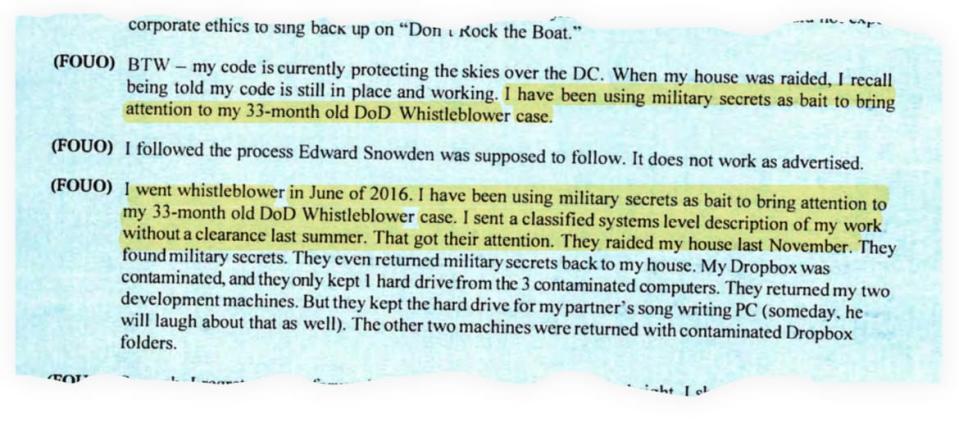He Leaked U.S. Missile Secrets. It Turned Into ‘a Dark Comedy of Errors.’

A former Raytheon missile defense engineer who recently pleaded guilty to leaking U.S. military secrets claims he did so only because his desperate attempts to correct a potentially deadly software error he accidentally made went completely unheeded by authorities.
“My approach and code were not adequately reviewed,” James Robert Schweitzer told The Daily Beast in his first public comments since his arrest. “I was told to ignore the anomaly that I introduced.”
The federal government, however, saw things quite differently. At the time, Schweitzer was at loggerheads with the Pentagon over his use of medical marijuana, which caused him to be stripped of his top secret security clearance. Unable to continue working in his chosen field, Schweitzer, who had hoped to stay at Raytheon until he retired, decided instead to exact revenge on the company by exposing classified information he believed he shouldn’t have had access to in the first place, according to prosecutors. The government’s court filings assert that Schweitzer’s motive was simply to get back at Raytheon for shunting him aside. To that end, Schweitzer told investigators he wanted to bring his supervisors down with him for “illegally” demanding he work on a classified project.
A Missile Engineer’s ‘Dark Fantasy’ and Alleged Revenge Plot
Today, Schweitzer, who says he sees himself not as a traitor but a whistleblower, is still reeling from being hauled in by the feds last year, describing the nightmarish experience as “a comedy of errors, as far as I’m concerned—a dark comedy of errors.”
As The Daily Beast exclusively reported at the time, Schweitzer, 58, was arrested and charged in December 2020 with malicious mischief and destruction of government property for sharing “national defense information” regarding U.S. missile sensors. Prosecutors said Schweitzer knew some of what he exposed “could result in American casualties abroad or in the United States,” which Schweitzer freely admits, insisting that’s why he was so eager to sound the alarm.
Schweitzer, a California resident, claims he reported the alleged software bug to the DoD hotline, the Army, the FBI, and every single member of Congress to no avail. According to him, authorities said they would take care of it, but never did in order to save face after deploying a supposedly broken system that was being used to, among other things, protect the airspace in the Washington, D.C., area, and could have cost thousands of lives. Court filings by investigators and prosecutors, who would not comment on the case, do not mention anything about this supposed anomaly.
Schweitzer, a deeply religious man who says he is on the milder end of the autism spectrum and very nearly became a Catholic priest, told investigators that he had “followed the process Edward Snowden was supposed to follow.” But, he said, it did “not work as advertised.”
In response to a detailed list of questions about Schweitzer’s claims The Daily Beast submitted to the FBI, a bureau spokesperson said, “Per DOJ policy, we neither confirm nor deny the existence of any investigation and do not have a comment for you.”
The majority of Schweitzer’s troubles can be traced back to 2014. While working at a Raytheon facility in Fullerton, California, Schweitzer developed classified radar signal processing software for use by the U.S. Army. But after he lost his clearance that August, Schweitzer claims he was kept on the classified project at the Army’s request. In a sprint to the finish in late 2015, Schweitzer said he was up late one night trying to address an “algorithmic instability” in the radar software. Aware of the impending deadline, along with instructions to deliver results, Schweitzer said he got a little sloppy and inadvertently introduced a vulnerability into the system.
According to Schweitzer, no one saw the bug as a big deal, and working on a fix got put on the backburner. In the meantime, Schweitzer said he was presented with a challenge coin for writing the supposedly faulty software. (Although the software vulnerability Schweitzer claims to have accidentally baked into the radar system was not discussed openly in court, Schweitzer made mention of it in posts on LinkedIn, Twitter, and other online sites. While being questioned by investigators in 2019, Schweitzer said he had been told by authorities that his code was “in place and working,” according to one DoD report.)
“I did not have a security clearance when I developed the classified code,” Schweitzer told The Daily Beast. “Raytheon management directed me to break the law, the Army was aware of Raytheon’s actions and looked the other way.”
The government claims Schweitzer “was indeed working close to but not in the classified realm,” according to internal DoD reports Schweitzer later obtained through the Freedom of Information Act, adding that Schweitzer was “removed from the project” once there was no further unclassified work to be done.

In June 2016, Schweitzer pulled off the first of what he calls his “stunts.” He submitted a complaint to the DoD Inspector General accusing Raytheon of committing security violations—namely, more than a dozen higher-ups he claimed had him work on a classified project without a proper clearance. Schweitzer’s complaint, according to court filings, “contained national defense information classified at the SECRET level.”
Schweitzer resigned from Raytheon the following month.
“Because of my horrible late night design decision, a key component of our nation’s homeland defenses could allow missiles/planes/drones to approach undetected,” Schweitzer told The Daily Beast. “I decided to get loud. I believe I was supposed to get loud.”
Schweitzer continued bombarding DoD over the next year-and-a-half with reports accusing Raytheon of violating protocols for handling classified information referring to his own work on classified systems without holding a clearance. He inundated the Inspector General with submissions, accusing Raytheon of wasteful spending, and pointed out that his own marijuana use had been a violation of the government’s drug-free workplace policy. Many of the complaints purposely included classified attachments. Schweitzer says the FBI told him he “overwhelmed” the IG with his activity, a situation suggested in court records.
The precise issue with the software remains classified, according to Schweitzer, who claims he is prohibited from sharing any details. Authorities have never confirmed or denied Schweitzer’s allegation about the bug. But at a September 2021 court hearing, Schweitzer told the judge, “If you understood the vulnerability, you would understand why I could not remain silent.”
Schweitzer told The Daily Beast that he often “abstracted the vulnerability” by referring to it as a “problem,” which he left undefined in his public releases, such as an article containing classified information he later posted to LinkedIn. He said the term “vulnerability” appears multiple times in discovery documents he was given access to by prosecutors, but isn’t allowed to share them. Today, Schweitzer describes his crimes as an act of protest. The feds saw them as, simply, crimes being committed by a disgruntled former employee bent on retribution.
Schweitzer became a medical marijuana patient in 2009. In 2010, he told Raytheon’s Fullerton Facility Security Officer, or FSO, that he planned on using medical marijuana for his struggles with insomnia, with a doctor’s prescription.
Schweitzer, who said he was barely getting by on about three hours of sleep each night, lived in California, where medical marijuana was legalized in 1996. He had tried Ambien and Sonata, which didn’t keep him asleep. Lunesta put him to sleep, but gave him “the most disgusting dreams I’ve ever had.” Schweitzer said he received verbal and written permission from the FSO, who informed him that he “only had to abide by state regulations.”
Only, this wasn’t quite true. Marijuana, even when prescribed by a physician, remains illegal under federal law. And since security clearances are issued by the federal government, federal rules apply. In 2014, Schweitzer was up for his standard 10-year security clearance review, and said it was then that he “self-identified” as a medical marijuana patient.
“When [the FSO] learned the real regulations, she indicated that DoD changed their position on medical marijuana,” Schweitzer told The Daily Beast.
The FSO’s “erroneous advice” is cited in the DOJ’s original complaint against Schweitzer, which says the mistake “mitigated past use” by Schweitzer. But DoD told Schweitzer he couldn’t use medical pot from then on. Schweitzer refused—and was stripped of his clearance in August.
The FSO, who is unnamed in the complaint, was unable to be reached for comment.
Raytheon brought in another engineer, who held a top secret clearance, to take over the classified portions of the missile defense software that Schweitzer was no longer supposed to be touching.
But Schweitzer’s bosses still had him working on sensitive aspects of the program, he told Army investigators in a series of recorded phone calls reviewed by The Daily Beast.
“They wanted their code, they wanted my skills on it, and this is how they could do it,” Schweitzer, who was earning more than $170,000 a year at Raytheon, said in one of the calls. “And once I figured out what was going on, that I was never going to get my clearance and I was being used...that was a big ‘Oh shit’ moment.”

In November 2018, after Schweitzer had been out of work for more than two years, a minister from Schweitzer’s congregation contacted the Huntington Beach Police Department, saying that Schweitzer had spoken to him about having a “dark fantasy” of shooting up government buildings to help get his message across. The cops raided his home early one morning, along with agents from the Army Criminal Investigation Division. His computers and digital devices were seized, and so were his husband’s.
“That was the first experience with law enforcement,” Schweitzer told The Daily Beast. “They showed up and they determined I was in crisis. And so they called in the county crisis manager… I shared my sad sack story, and they said they could do nothing.”
Fearing his grievances still were not being taken seriously, Schweitzer in March 2019 decided to go scorched-earth. He posted classified documents to a public Dropbox link, wrote and posted an article on LinkedIn that contained U.S. military secrets, and tweeted “congratulations” to Iran after a September 2019 drone strike on Saudi oil facilities.
Schweitzer continued needling authorities. In one instance, he sent a hemorrhoid cushion to the DoD Inspector General with a note reading, “From your favorite whistleblower and pain in the rear. Raytheon management directed me to break the law. They got bonuses for it, and you ended up with me. It's time for you to call.”
Through it all, Schweitzer knew he was playing with fire, whatever his true intentions.
“I crossed the line,” he wrote to a coworker in September 2019. “I also am getting ready to push the paper on WikiLeaks. I have been sending military secrets to DoD for the past year... I have been using... military secrets as bait. You would have thought that would have really upset someone by now.”
Among other things, Schweitzer sent classified national defense information about secret missile sensor systems over unsecured computer networks, to Pentagon employees, coworkers at his own company, and members of the news media.
“I’m done playing,” Schweitzer wrote to the Pentagon in July 2020. “If someone finds my postings and pulls off an attack... I will be thrilled that someone finally took some form of action.”
Six months later, Schweitzer was arrested by the FBI. He was brought to court and released a few hours later on $250,000 bond.
“If you’re ever going to be arrested, wear long socks,” Schweitzer told The Daily Beast. “Because shackles against uncovered ankles is really disconcerting.”
After nearly a year in court, Schweitzer pleaded guilty to malicious interference with communications lines, a felony carrying a maximum sentence of 10 years in federal prison.
At his sentencing in September, Schweitzer explained his rationale for doing what he did. He provided The Daily Beast with a copy of a statement he read, which is not publicly available.
“I was deliberate, escalating incrementally,” Schweitzer told the court. “I risked my life to get my vulnerability properly fixed. I want my government’s whistleblower programs to work. ‘See Something, Say Something,’ should mean something. Looking the other way is the most expeditious, but it is a horrible national security model.”Schweitzer said he “tried to do the right thing,” based on the information he had, “[a]t each decision point along the way.”
“I was compromised,” he continued. “I was faced with a collection of horrible choices (silence could be lethal). I tried to find the best path to getting my vulnerability fixed. My attempts to communicate the vulnerability were consistently failing… I followed the process until the process seemed broken; then I got loud, and I kept getting louder.”
He said he had been affected deeply by the explosion of the Space Shuttle Challenger disaster in 1986, and felt the software glitch was his “O-Ring moment”—a reference to the failure of a seal between the Challenger’s solid rocket boosters, which caused the fatal disaster.
In May 2020, some 10 months before he was arrested, Schweitzer sent a set of documents to the Pentagon that he called the “Solution Package.” The package was meant to help the DoD understand and address the vulnerability baked into the missile defense software Schweitzer had introduced. When he did this, Schweitzer included classified information over unclassified networks with the knowledge that DoD would subsequently be forced to sanitize its servers.
“Mr. Schweitzer’s hope at the time was that the nuisance created through this tactic would result in the DoD taking his concerns seriously,” his public defender told the court this past August. “But his conduct was illegal, and it provides the factual basis for the crime—malicious interference with communication lines—for which Mr. Schweitzer has [pleaded] guilty here.”Prosecutors, who defined Schweitzer’s steady stream of complaints as “classified spamming,” argued that they weren’t convinced of Schweitzer’s “altruistic motivations,” and asked for two years of probation. On Sept. 3, Schweitzer was sentenced to 15 months probation, and ordered to pay $15,000 in restitution for the costs DoD incurred to clean up their classified computer systems. A proposed $1,000 fine was dropped as part of the plea agreement.
“I believe the Court would understand my persistence, aggressiveness, and occasional belligerence; if the Court understood the consequences of the vulnerability I accidentally created,” Schweitzer said in court. “The potential consequences are not hyperbole.”
As for his “dark fantasy” about spraying bullets into a federal building, Schweitzer told The Daily Beast he wants to set the record straight. In fact, he said, he was working on a piece of fiction in favor of a national gun registry.
“In this fiction, things went differently after the Las Vegas Shooting,” he said. “The story hero/villain takes the fight to CPAC. The story describes a mass shooting event at CPAC 2019. The CPAC families finally see the light. Within six months, legislation is passed to establish a national gun registration database. I shared my dark fantasy with a young clergyman; he thought CPAC was part of the government.”
Court filings cite at least five separate interviews between Schweitzer and law enforcement about the “fantasy.” Each time, Schweitzer assured investigators that he had “no plans” to commit violence, and that he was not planning any sort of attack.
Now that he has been sentenced, Schweitzer’s lawyer has at last given him the go-ahead to speak to the media. When he contacted The Daily Beast, Schweitzer said he was happy to finally have a phone again after the feds confiscated his three times over the past year.
Schweitzer now believes his alleged software vulnerability has been patched, he told the judge in his case. In a note he sent to the court at the end of October and provided to The Daily Beast, Schweitzer said he has “90% confidence” his “reckless code is no longer a threat to my homeland. I have no further need to post information about an insufficiently reviewed product that was protecting our country. I intentionally risked my life to get my vulnerability fixed. I believe I achieved my objective and I have survived the gauntlets. I had no idea it would be this difficult to get a bug fixed, but I think it was necessary. My persistence in reaching my goal has taken many tolls. It has been an interesting adventure and an unexpected journey of faith.”
Plea negotiations were “horrible,” Schweitzer told The Daily Beast.
“The judge called me arrogant for not heeding repeated warnings from DoD and FBI agents,” he said. “I struggled with the temptation to remind the judge that I was the author of a vulnerability that could have claimed thousands of lives.”
Although the terms of his probation require any computer Schweitzer uses to have monitoring software installed, his “days of posting and sharing classified information are over,” he insisted.
In 2019, during Schweitzer’s doomed quest, Raytheon lost the $281 million contract to Lockheed Martin.
“The Army deserved a better radar system,” Schweitzer says now.
When asked where he goes from here, Schweitzer—now a convicted felon and unable to ever work again for the government—replied simply, “Forward.”
Got a tip? Send it to The Daily Beast here
Get our top stories in your inbox every day. Sign up now!
Daily Beast Membership: Beast Inside goes deeper on the stories that matter to you. Learn more.

